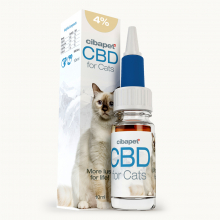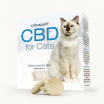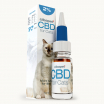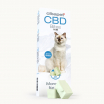How Do Cats React to CBD?
Published:
Have you ever wondered if CBD could help your furry feline friend? As CBD products grow in popularity for humans, more pet owners are becoming interested in the potential benefits of cannabidiol for cats. But how exactly does CBD affect cats and is it safe to give to your pet? This informative guide will explore everything you need to know about using CBD for cats.
Contents:
- What Is CBD and How Does It Work?
- How Does CBD Make Cats Feel?
- What Symptoms and Conditions Can CBD Help With in Cats?
- Is CBD Safe for Cats? Possible Side Effects to Watch For
- What’s the Best Way to Give CBD to Cats?
- What’s a Safe Starting Dose of CBD for Cats?
- Tips for Giving CBD to Your Cat
- Frequently Asked Questions About CBD for Cats
- CBD Offers Exciting Potential Benefits for Cats
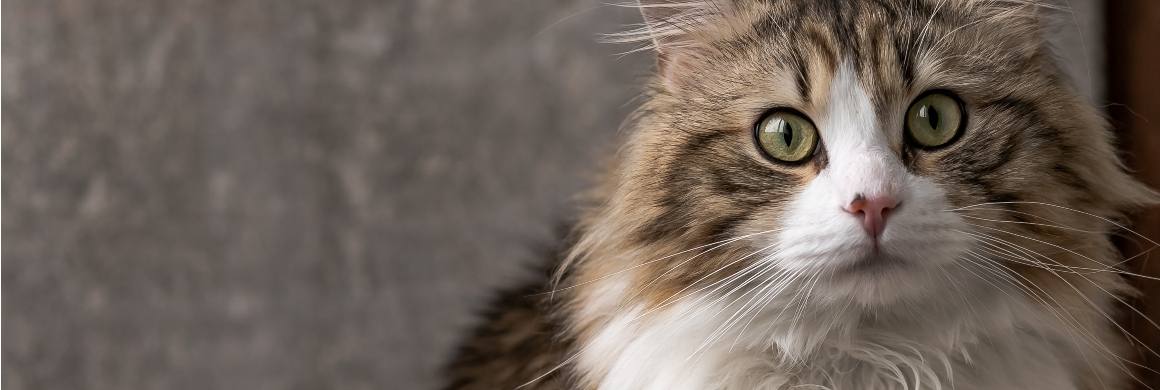
What Is CBD and How Does It Work?
CBD, short for cannabidiol, is one of over 100 active compounds found in the cannabis plant called cannabinoids. Unlike the famous cannabinoid THC, CBD is non-intoxicating, meaning it will not get users or pets high.
So how does CBD work in the body? All mammals have an endocannabinoid system (ECS) that regulates various bodily functions like pain, mood, sleep, and appetite. The ECS produces natural endocannabinoids that bind to cannabinoid receptors throughout the body. CBD interacts with these receptors, helping to reduce inflammation and maintain homeostasis.
Now that we understand the basics of CBD, let’s explore how it affects our feline friends.
How Does CBD Make Cats Feel?
Since cats have an endocannabinoid system just like humans, they can also benefit from supplemental CBD. But cats tend to be more sensitive to cannabinoids than people. This means CBD affects them strongly even at relatively low doses.
CBD typically makes cats feel relaxed without causing heavy sedation. It may slightly alter their behavior or elevate their mood. Many cat owners report their pets seem happier, fuller of spirit, and more affectionate after taking CBD.
So in what ways can CBD impact how cats feel? Here are some of the main effects:
- Reduced anxiety, stress, and fear
- Increased relaxation and calmness
- Relief from chronic pain or arthritis
- Improved mobility and activity levels
- Better appetite and less nausea
- Less inflammation and improved skin/coat health
- Regulation of sleep cycles and patterns
The key is finding the optimal dose to achieve these therapeutic effects without causing lethargy or other unwanted side effects in your cat. Always consult your veterinarian before giving CBD to pets.
What Symptoms and Conditions Can CBD Help With in Cats?
While more research is still needed, current evidence and pet owner anecdotes suggest CBD can effectively help cats manage many symptoms and conditions. Here are some of the main feline health issues CBD may alleviate:
Anxiety and Stress
Does your cat hide under the bed all day, destroy furniture, or vocalize excessively when stressed? Just like humans, cats can suffer from anxiety, phobias, and stress triggers. CBD’s calming properties may help anxious cats relax and feel more at ease.
Arthritis and Chronic Pain
Older cats or those with injuries often develop painful arthritis and inflammation in their joints. CBD is a natural anti-inflammatory that can block pain signals and improve mobility. Cats may play more, have improved balance, and seem less stiff or reluctant to move after taking CBD.
Cancer Symptoms and Treatment Side Effects
For cats undergoing cancer treatment, CBD can help reduce symptoms like vomiting, poor appetite, and pain. CBD may also combat the gastrointestinal side effects of chemotherapy and radiation.
Skin Conditions
Feline skin issues like itching, hot spots, alopecia, and rashes may result from allergies or other problems. The antioxidants and anti-inflammatory properties in CBD can help soothe skin irritation and promote healing.
Seizures and Epilepsy
Though less common than in dogs, some cats do suffer from seizures and epilepsy. CBD shows anticonvulsant effects that may reduce the frequency and intensity of seizures. Always consult your vet first before using CBD for this serious condition.
Inflammatory Bowel Disease (IBD)
CBD can help with gut health by reducing intestinal inflammation. For cats with IBD, CBD may improve digestion, normalize stool, increase appetite, and reduce vomiting or diarrhea.
So in summary, the therapeutic potential of CBD spans from mood and skin issues to chronic pain and gastrointestinal problems in cats. Always chat with your vet to see if CBD could benefit your cat’s specific health condition.
Is CBD Safe for Cats? Possible Side Effects to Watch For
While CBD is generally well-tolerated by cats, there are some potential side effects to look out for when giving it to your pet. Here are the main safety considerations:
- Drowsiness - Since CBD is a relaxant, high doses may excessively sedate some cats, impacting their mobility and appetite. Start with a low dose and titrate up slowly while monitoring your cat's reaction.
- Changes in liver enzymes - High doses of CBD may temporarily elevate liver enzymes in felines. Have your vet run periodic bloodwork to monitor your cat’s liver health.
- Interactions with other medications - CBD can alter how cats metabolize some types of drugs. Check with your vet about potential medication interactions.
- Gastrointestinal upset - CBD may cause vomiting, diarrhea or lack of appetite in some cats, especially at high doses. Lower the dose or try a different CBD product if GI issues arise.
When used properly under veterinary supervision, CBD is considered low-risk for cats. But improper use could lead to the side effects above. Always consult with your vet before giving any new supplements to your pet.
What’s the Best Way to Give CBD to Cats?
CBD is available for cats in a variety of product types and delivery methods. Here are some of the most popular options:
CBD Oils and Tinctures
CBD oil or tincture is the most common way to administer cannabidiol to pets. The CBD is suspended in a carrier oil like hemp seed or coconut oil and dosed using a dropper bottle. You can add drops directly to your cat’s food, water or treats.
CBD Pet Treats or Chews
For fussy cats that won’t take CBD oil, treats and chews are a handy option. They come flavored and dosed for cats in bite-sized pieces your pet will enjoy. However, it may be harder to get an exact dose.
Topical CBD Balms and Salves
For skin conditions or arthritis pain, CBD balms provide localized relief when massaged into aching joints or problem areas. Avoid applying topicals to open wounds or broken skin.
Transdermal CBD Patches
These sticky patches allow CBD to be absorbed through the skin and enter the bloodstream. They provide consistent doses over 12 to 24 hours. Apply to a hairless area like the ear for best absorption.
No matter which product type you choose, always follow dosing directions carefully and monitor your cat for any reactions. Consulting a holistic vet for guidance is highly recommended.
What’s a Safe Starting Dose of CBD for Cats?
Due to their small size, cats need much lower CBD doses than humans. The general recommended starting dosage is 0.5 to 5 mg per 10 lbs body weight, once or twice daily.
So for a 10 lb cat, start with 0.5 to 2 mg of CBD daily. For a larger 20 lb cat, try 1 to 4 mg CBD per dose. Split this into AM and PM for an optimal effect.
When first starting CBD, begin on the low end of the dose range and gradually increase over 2-4 weeks while assessing your cat's response and watching for side effects. Never exceed 5 mg per 10 lbs without vet approval. Record keeping can help fine tune your cat’s ideal dosage.
Also pay attention to the product strength - a 15 ml CBD oil may contain 150 mg total CBD, so adjust the dose size accordingly. Finding the therapeutic “sweet spot” takes some trial and error. Patience and proper dosage is key for both safety and results.
7 Tips for Giving CBD to Your Cat
Ready to introduce CBD to your feline companion? Here are some handy tips for making CBD supplementation easy and effective for your cat:
1. Choose high quality products - Research brands thoroughly and only buy CBD products specifically formulated for pets. Seek out organic, non-GMO, contaminant-free products from ethical brands.
2. Go low and slow - Start with the lowest effective dose and increase gradually each week to find the ideal amount. Don’t overdo it!
3. Give CBD with food - Mixing CBD oil or treats in with your cat’s favorite wet or dry food can boost palatability and absorption.
4. Find the best delivery method - Try different CBD products to see which your cat prefers. Oils, treats, topicals - find what works!
5. Stick to a schedule - For the most benefits, give CBD doses at consistent timings each day. This helps keep optimal levels in your cat’s system.
6. Track effects and adjust - Keep notes on how your cat responds as you slowly increase the dosage. Look for side effects. Tweak the amount based on reactions.
7. Consult your vet - Always talk to your cat's vet before starting CBD. Discuss dosing, potential interactions, side effects, and monitoring. Get your vet’s guidance.
Following these tips will help ensure a safe, effective CBD regimen that maximizes the benefits for your beloved feline. While more studies are still needed, pet owner anecdotes and existing research suggest CBD can potentially improve quality of life for many cats. As always, work closely with your vet to determine if CBD is right for your furry friend.
Frequently Asked Questions About CBD for Cats
Here are answers to some common questions cat owners have about using CBD for their pets:
Is CBD legal to give to cats?
In most places, CBD is legal as long as it’s derived from hemp and contains less than 0.3% THC. However, check your local laws to be sure before purchasing any CBD products for your cat.
How long does it take for CBD to work in cats?
Effects should be noticeable within 30 minutes to 2 hours after dosing. But optimal benefits may take 2 to 4 weeks of consistent supplementation as CBD builds up in your cat’s system. Give CBD time to work its magic!
Can CBD make my cat high or impair movement?
No, CBD will not intoxicate cats or significantly alter their motor functions and mobility. However, excessive doses may cause moderate sedation. Start low and increase slowly while monitoring your cat's reaction.
Are human CBD products safe to give cats?
Never give your cat CBD products formulated for humans! The dosing is much higher and not suitable or safe for pets. Always choose CBD products specifically made for cats to avoid adverse effects. Consult your vet too.
How long does CBD stay in a cat's system?
CBD metabolites can be detected in urine and blood for around 2 to 5 days after dosing. Effects will taper according to this elimination timeline. Dose CBD consistently each day to maintain steady levels.
Hopefully this Q&A helps clarify some common questions about using CBD for feline health and wellness. As always, discuss CBD with your cat’s veterinarian before starting any new supplement routine.
CBD Offers Exciting Potential Benefits for Cats
As the popularity and availability of CBD grows, more cat owners are exploring its promising health benefits for pets. When used properly under veterinary guidance, CBD appears quite low-risk for cats and may help relieve symptoms from anxiety and arthritis to cancer and seizures.
Always start with small doses and gradually increase over several weeks while monitoring your cat’s response. Find a quality CBD product made just for cats and stick to regular dosing for the best results. Partner with your vet throughout the process to ensure a safe, effective CBD regimen tailored to your feline friend.
While more clinical research is still needed, existing studies and pet owner testimonials suggest CBD can give cats an improved quality of life. If you have an aging or symptomatic feline, talk to your vet about whether CBD could provide some natural relief and comfort for your beloved pet.









